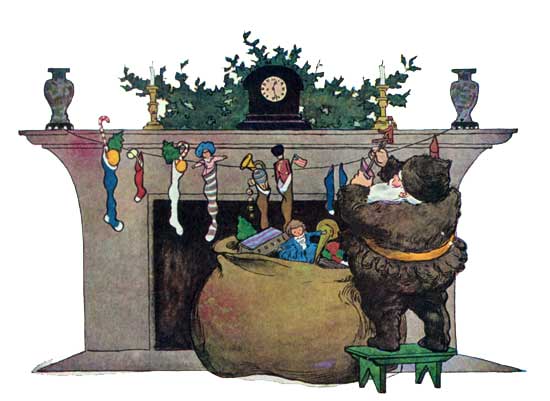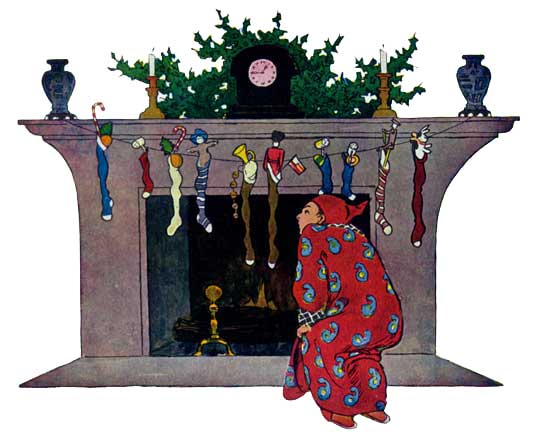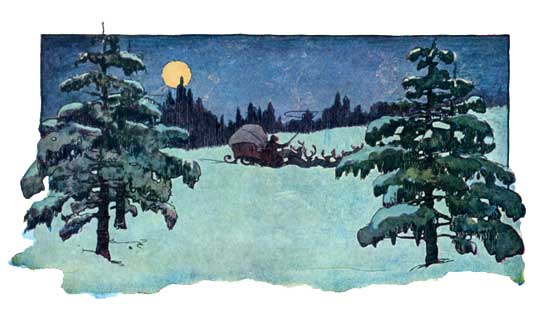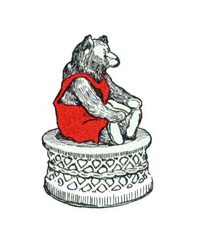'Twas the night before Christmas, when all through the house
Not a creature was stirring, not even a mouse;
The stockings were hung by the chimney with care,
In hopes that St. Nicholas soon would be there;
The children were nestled all snug in their beds,
While visions of sugar-plums danced in their heads;
And mamma in her ’kerchief, and I in my cap,
Had just settled our brains for a long winter’s nap,
When out on the lawn there arose such a clatter,
I sprang from the bed to see what was the matter.
Away to the window I flew like a flash,
Tore open the shutters and threw up the sash.
The moon on the breast of the new-fallen snow
Gave the lustre of mid-day to objects below,
When, what to my wondering eyes should appear,
But a miniature sleigh, and eight tiny reindeer,
With a little old driver, so lively and quick,
I knew in a moment it must be St. Nick.
More rapid than eagles his coursers they came,
And he whistled, and shouted, and called them by name;
"Now, Dasher! now, Dancer! now, Prancer and Vixen!
On, Comet! on, Cupid! on, Donder and Blitzen!
To the top of the porch! to the top of the wall!
Now dash away! dash away! dash away all!"
As dry leaves that before the wild hurricane fly,
When they meet with an obstacle, mount to the sky;
So up to the house-top the coursers they flew,
With the sleigh full of Toys, and St. Nicholas too.
And then, in a twinkling, I heard on the roof
The prancing and pawing of each little hoof.
As I drew in my head, and was turning around,
Down the chimney St. Nicholas came with a bound.
He was dressed all in fur, from his head to his foot,
And his clothes were all tarnished with ashes and soot;
A bundle of Toys he had flung on his back,
And he looked like a pedler just opening his pack.
His eyes—how they twinkled! his dimples how merry!
His cheeks were like roses, his nose like a cherry!
His droll little mouth was drawn up like a bow
And the beard of his chin was as white as the snow;
The stump of a pipe he held tight in his teeth,
And the smoke it encircled his head like a wreath;
He had a broad face and a little round belly,
That shook when he laughed, like a bowlful of jelly.
He was chubby and plump, a right jolly old elf,
And I laughed when I saw him, in spite of myself;
A wink of his eye and a twist of his head,
Soon gave me to know I had nothing to dread;
He spoke not a word, but went straight to his work,
And filled all the stockings; then turned with a jerk,
And laying his finger aside of his nose,
And giving a nod, up the chimney he rose;
He sprang to his sleigh, to his team gave a whistle,
And away they all flew like the down of a thistle,
But I heard him exclaim, ere he drove out of sight,
"Happy Christmas to all, and to all a good-night."
O'er the hill and o'er the vale,
Come three kings together,
Caring nought for snow and hail,
Cold and wind and weather;
Now on Persia's sandy plains,
Now where Tigris swells with rains,
They their camels tether;
Now through Syrian lands they go,
Now through Moab, faint and slow,
Now o'er Edom's heather.
O'er the hill and o'er the vale,
Each king bears a present;
Wise men go a Child to hail,
Monarchs seek a peasant:
And a star in front proceeds,
Over rocks and rivers leads,
Shines with beams incessant:
Therefore onward, onward still!
Ford the stream and climb the hill:
Love makes all things pleasant.
He is God ye go to meet:
Therefore incense proffer:
He is King ye go to greet;
Gold is in your coffer.
Also Man, He comes to share
Ev'ry woe that man can bear;
Tempter, railer, scoffer:
Therefore now, against the day
In the grave when Him they lay,
Myrrh ye also offer.
I heard the bells on Christmas DayTheir old, familiar carols play,And wild and sweetThe words repeatOf peace on earth, good-will to men!And thought how, as the day had come,The belfries of all ChristendomHad rolled alongThe unbroken songOf peace on earth, good-will to men!Till, ringing, singing on its wayThe world revolved from night to day,A voice, a chime,A chant sublimeOf peace on earth, good-will to men!Then from each black, accursed mouthThe cannon thundered in the South,And with the soundThe Carols drownedOf peace on earth, good-will to men!And in despair I bowed my head;‘There is no peace on earth,’ I said;‘For hate is strong,And mocks the songOf peace on earth, good-will to men!’Then pealed the bells more loud and deep:‘God is not dead; nor doth he sleep!The Wrong shall fail,The Right prevail,With peace on earth, good-will to men!’
We squealed and slid across the wandering creek bed's overflows, upon our little legs and shiny skates, desperately trying to stay upright, o'er frozen pools of gathered water held fast in windage ripples and protruding branches, navigating as we could the wooded stream's winding length swept bare the cold December winds one happy Christmas Day.
Across the frozen fields we glimpse our dairy farm upon its rounded hills, and grandma's aged house nearby our own, who, as a little girl did skate as we this day, sliding upon our feet and bellies, laughing as we slid and fell - or muttering a few cross words in pain - while brothers, mom and dad darted about, grinning our wizened collie's splaying legs, like my own, seeking purchase upon stilled land and wind and water.
R.E. SlaterNovember 26, 2022@copyright R.E. Slater Publicationsall rights reserved
Silent night, holy night
All is calm, all is bright
Round yon Virgin Mother and Child
Holy Infant so tender and mild
Sleep in heavenly peace
Sleep in heavenly peace
Silent night, holy night!
Shepherds quake at the sight
Glories stream from heaven afar
Heavenly hosts sing Alleluia!
Christ, the Saviour is born
Christ, the Saviour is born
Silent night, holy night
Son of God, love's pure light
Radiant beams from Thy holy face
With the dawn of redeeming grace
Jesus, Lord, at Thy birth
Jesus, Lord, at Thy birth "
Away in a manger, no crib for a bed,
The little Lord Jesus laid down His sweet head.
The stars in the bright sky looked down where he lay—
the little Lord Jesus asleep on the hay.
The cattle are lowing, the baby awakes,
But little Lord Jesus, no crying He makes.
I love thee, Lord Jesus! look down from the sky,
And stay by my cradle till morning is nigh.
O little town of Bethlehem, how still we see thee lie!Above thy deep and dreamless sleep the silent stars go by.Yet in thy dark streets shineth the everlasting Light;The hopes and fears of all the years are met in thee tonight.For Christ is born of Mary, and gathered all above,While mortals sleep, the angels keep their watch of wondering love.O morning stars together, proclaim the holy birth,And praises sing to God the King, and peace to men on earth!How silently, how silently, the wondrous Gift is giv’n;So God imparts to human hearts the blessings of His Heav’n.No ear may hear His coming, but in this world of sin,Where meek souls will receive Him still, the dear Christ enters in.Where children pure and happy pray to the blessèd Child,Where misery cries out to Thee, Son of the mother mild;Where charity stands watching and faith holds wide the door,The dark night wakes, the glory breaks, and Christmas comes once more.O holy Child of Bethlehem, descend to us, we pray;Cast out our sin, and enter in, be born in us today.We hear the Christmas angels the great glad tidings tell;O come to us, abide with us, our Lord Emmanuel!
Love came down at Christmas,
Love all lovely, Love Divine;
Love was born at Christmas,
Star and angels gave the sign.
Worship we the Godhead,
Love Incarnate, Love Divine;
Worship we our Jesus:
But wherewith for sacred sign?
Love shall be our token,
Love be yours and love be mine,
Love to God and all men,
Love for plea and gift and sign
Let us end these "Stories of Christmas" with prayer and purpose for the war torn people of the Ukraine harmed and broken by the terrorism of a solitary Russian leader who defies his people and those nations around him with defilement across all he deigns.Like the abolitionist minister of old, Thomas Hill, we prayer and act on behalf of the Ukrainian people who now suffer winter's brutal cold, starvation, no medicines, and loss of family and friends. We now pray and purpose a Second Advent upon the evils of this world which refuse to love and share humanity's feep need for living altars and remembered sepulchre's as reminders that we each share the other's burdens.R.E. SlaterNovember 26, 2022
Not in a humble manger now,
Not of a lowly virgin born,
Announced to simple shepherd swains,
That watch their flocks in early morn ;Nor in the pomp of glory, come,
While throngs of angels hover round,
Arrayed in glittering robes of light,
And moving to the trumpet’s sound ;But in the heart of every man,
O, Jesus, come, and reign therein,
And banish from the human breast
The darkening clouds of guilt and sin.Come, spread thy glory over earth,
Fill every heart with truth and love,
Till thy whole kingdom here below
Be filled with peace like that above.For such a glory, when on earth,
Thou prayedst to thy Father, God ;
He heareth thee, and soon will spread
Thy glory and thy truth abroad.Then shall no more by brothers’ hands
The blood of brother men be spilled,
Nor earth’s fair scenes with captives’ tears
And groans of dying slaves be filled.
Postscript:
“Few if any persons in the community had so great cause for sorrow as the Abolitionists. One of the towers of our strength had fallen. The greatness of our loss was dwelt upon at the annual meeting of the Massachusetts Society a few days afterward, and it was unanimously voted :
‘That an address on the life and character of Charles Follen, and in particular upon his early and eminent services to the cause of abolition, be delivered by such person and at such time and place as the Board of Managers shall appoint.’
“Their appointment fell upon me, and I was requested to give notice so soon as my eulogy should be written. I gave such a notice early in February, when I was informed by the managers that they had not yet been able to procure a suitable place, for such a service as they wished to have in connection with my discourse. They had applied for the use of every one of the Unitarian and for several of the Orthodox churches in Boston, and all had been refused them. It was said that Dr. Channing did obtain from the trustees of Federal Street Church consent that the eulogy on Dr. Follen, whom he esteemed so highly, might be pronounced from his pulpit. But another meeting of the trustees, or of the proprietors, was called, and that permission was revoked. More sad still the meeting-house at East Lexington, which had been built under his direction, which he was coming from New York to dedicate, and in which he was to have preached as the pastor of the church if his life had been spared, — even that meeting-house was refused for a eulogy and other appropriate exercises in commemoration of the early and eminent services of Dr. Follen to the cause of freedom and humanity in Europe, and more especially in our country. Such was the temper of that time, such the opposition of the people in and about the metropolis of New England to Mr. Garrison and his associates. …”
Eliza Lee Follet published her husband’s memoirs after his death, wrote and edited children’s publications and continued to support anti-slavery causes. She died at age 72 at her home in Brookline, MA. on January 26, 1860 before the Civil War began.
Thomas Hill earned his Bachelor of Arts degree from Harvard the same year that he wrote this poetry pamphlet which ended with the Christmas poem above. In 1845, Thomas Hill earned a Doctor of Divinity degree. He was installed as pastor at the Unitarian Church in Waltham, MA., and 14 years later, took the position of President of Antioch College, Ohio, as well as pastor of the Church of the Redeemer in Cincinnati.
Dr. Hill was chosen to be President of Harvard in 1862, a position he held throughout the Civil War. He had occasion that same year to write to President Lincoln to advise that his son, Robert, whom Dr. Hill referred to as “Lincoln, Junior,” would be publicly admonished for smoking in Harvard Square.
Hill resigned from Harvard in 1868 for health reasons and spent his remaining years as pastor of the First Unitarian Church in Portland, ME.
Additional Resources
Dr. Thomas Hill: The Unitarian, Vol. 6 (1891)
Loss of Steamer Lexington: Power for Sanity: Selected Editorials of William Cullen Bryant, 1821-1861, by William Cullen Bryant, Fordham Univ. Press (1994):
At his death in 1878 William Cullen Bryant had been, for fifty-one years, the chief editor and a principal owner of the New York Evening Post. The paper had been started in 1801 by lawyer William Coleman in association with the Federalist political Alexander Hamilton. In 1826, Coleman hired Bryant as a reporter. Although Coleman may have engaged his services because of his growing distinction as a poet, Bryant was also by then an experienced writer of prose, having published more than fifty critical and familiar essays. He had been both editor of and most frequent writer for the monthly New York Review and the United State Review, and was known widely for his lectures on poetry before the New York Athenaeum. By the time he assumed the direction of the Evening Post after Coleman's death in 1829 he had proved himself, in three annual volumes of the holiday gift book The Talisman, to be proficient in a wit and irony soon reflected in his editorials.Bryant brought the conservative journal to the support of the Democratic Party of President Andrew Jackson, and held it thereafter to liberal principles, advocating free trade, free labor, and Free Soil. Except for the years from 1829 to 1836, Bryant held the editorial pen largely alone until after the Civil War. Occasional contributors formed a representative roster of leaders in many fields: Charles Francis Adams, Thomas Hart Benton, Francis P. Blair, Salman P. Chase, Thomas Cole, James Fenimore Cooper, Hamilton Fish, Parke Godwin (Bryant's son-in-law), Bret Harte, James K. Paulding, John Randolph, Samule J. Tilden, Martin and John Van Buren, Artemus Ward, Gideon Wlles, Walt Whitman, and Silas Wright. And now and then there were articles by British Parliamentarian Richard Cobden and artist-economist George Harvey, and the French critic Charles Sainte-Beuve.Bryant's editorials after 1860 suggest separate treatment. The present volume traces the growth of his political and social maturity as he made of a conservative, parochial, small-city newspaper into a national organ which Charles Francis Adams in 1850 called the best daily journal in the United States.



















 mid the many celebrations last Christmas Eve, in various places by different persons, there was one, in New York City, not like any other anywhere. A company of men, women, and children went together just after the evening service in their church, and, standing around the tomb of the author of “A Visit from St. Nicholas,” recited together the words of the poem which we all know so well and love so dearly.
mid the many celebrations last Christmas Eve, in various places by different persons, there was one, in New York City, not like any other anywhere. A company of men, women, and children went together just after the evening service in their church, and, standing around the tomb of the author of “A Visit from St. Nicholas,” recited together the words of the poem which we all know so well and love so dearly.
 was the night before Christmas, when all through the house
was the night before Christmas, when all through the house
 he children were nestled all snug in their beds,
he children were nestled all snug in their beds,
 hen out on the lawn there arose such a clatter,
hen out on the lawn there arose such a clatter,
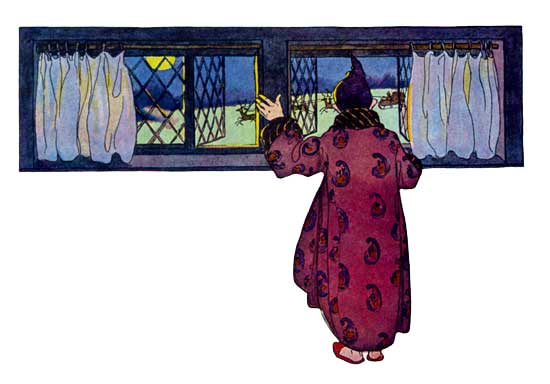




 ow, Dasher! now, Dancer! now, Prancer and Vixen!
ow, Dasher! now, Dancer! now, Prancer and Vixen!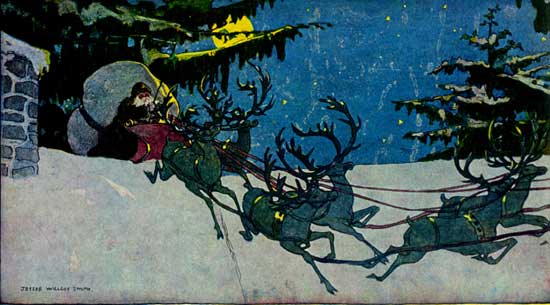
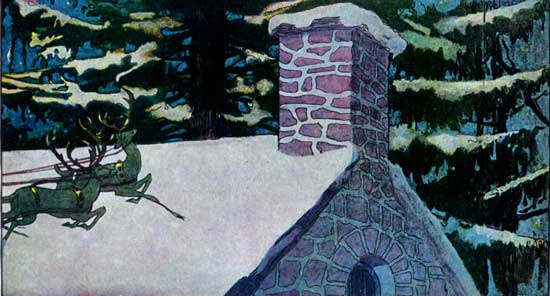


 s dry leaves that before the wild hurricane fly,
s dry leaves that before the wild hurricane fly,

 nd then, in a twinkling, I heard on the roof
nd then, in a twinkling, I heard on the roof e was dressed all in fur, from his head to his foot,
e was dressed all in fur, from his head to his foot,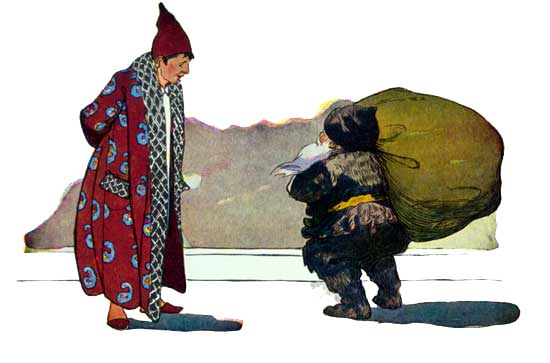
 is eyes—how they twinkled! his dimples how merry!
is eyes—how they twinkled! his dimples how merry!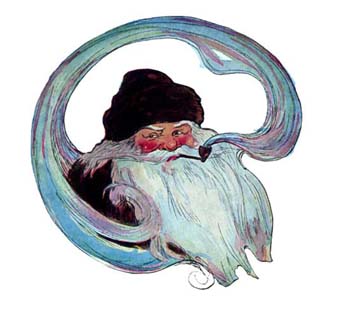
 he stump of a pipe he held tight in his teeth,
he stump of a pipe he held tight in his teeth,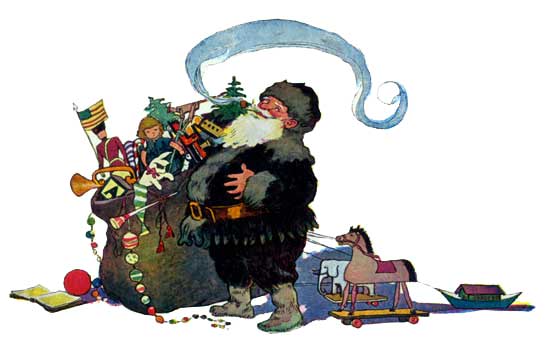
 e was chubby and plump, a right jolly old elf,
e was chubby and plump, a right jolly old elf,